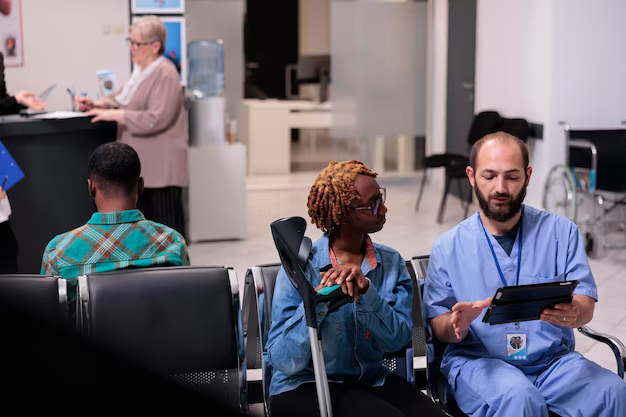Your Guide to Can Undocumented Immigrants Get Medicare
What You Get:
Free Guide
Free, helpful information about Medicare Insurance and related Can Undocumented Immigrants Get Medicare topics.
Helpful Information
Get clear and easy-to-understand details about Can Undocumented Immigrants Get Medicare topics and resources.
Personalized Offers
Answer a few optional questions to receive offers or information related to Medicare Insurance. The survey is optional and not required to access your free guide.
Can Undocumented Immigrants Access Medicare? Here's What You Need to Know
In the complex landscape of healthcare access, especially in the United States, questions often arise about eligibility for specific programs. One such question is whether undocumented immigrants can get Medicare. To provide a straightforward answer: undocumented immigrants are not eligible for Medicare, as the program is designed primarily for U.S. citizens and permanent residents aged 65 and older. Let’s explore why this is the case and what alternatives might be available.
Understanding Medicare Eligibility
Medicare, a federally funded healthcare program, serves primarily older adults and younger individuals with disabilities. Eligibility typically requires U.S. citizenship or lawful permanent residency. This criterion automatically excludes undocumented immigrants from the program, as they lack formal legal status in the U.S. Moreover, most Medicare recipients have often contributed to the system through payroll taxes during their working years.
Healthcare Options for Undocumented Immigrants
Emergency Medicaid: While undocumented immigrants cannot access Medicare, they may qualify for emergency Medicaid. This program covers urgent medical needs, including labor and delivery, without considering immigration status.
Community Health Centers: Numerous federally funded health centers offer services on a sliding fee scale, catering to those based on their ability to pay, regardless of immigration status. These centers are pivotal in providing primary care services to underserved populations.
State-Specific Programs: Some states have enacted policies to cover specific groups of undocumented immigrants. California, for instance, extends healthcare coverage to undocumented children and young adults under certain circumstances.
Charitable and Nonprofit Organizations: Many nonprofits and charities provide medical services to undocumented immigrants. These organizations often concentrate on routine care, preventative services, and chronic disease management, all essential particles of overall well-being.
Expanding the Possibilities: Financial and Educational Support
While healthcare access remains a challenge, undocumented immigrants can explore other avenues of support that significantly impact their well-being and financial security.
Government Aid Programs: Some states offer limited financial assistance for families, focusing on basic needs such as housing and food security.
Educational Opportunities: Undocumented immigrants can pursue certain educational grants and scholarships, specifically tailored for non-citizens. The DREAM Act, for example, marks an essential legislative effort that provides a pathway for higher education access.
Financial Assistance and Debt Relief: Although accessing traditional credit options might be difficult, various credit unions and financial institutions offer tailored solutions, ensuring that undocumented communities can manage financial burdens effectively.
Work Opportunities: For those eligible under DACA, temporary work authorization can facilitate better financial planning and access to resources that pave the way for future stability.
Navigating these systems requires diligence and persistence, but the opportunities are there for those willing to look into them. Whether you seek healthcare, education, or financial security, understanding what's available and how to access it can make all the difference.
Explore These Valuable Resources:
- 📑 Emergency Medicaid: Coverage for urgent medical situations regardless of status.
- 🏥 Community Health Centers: Affordable healthcare on a sliding scale.
- 🌍 State Programs: States like California offer more inclusive healthcare solutions.
- 🎓 Educational Grants: Scholarships and grants aimed at non-citizens striving for higher education.
- 💼 DACA Work Authorization: Exploring employment opportunities through Deferred Action for Childhood Arrivals.
- 💰 Financial Solutions: Alternative credit solutions like credit unions aimed at aiding those without traditional bank access.
- 🤝 Nonprofit Health Services: Charitable organizations aiming to fill healthcare gaps.
What You Get:
Free Medicare Insurance Guide
Free, helpful information about Can Undocumented Immigrants Get Medicare and related resources.

Helpful Information
Get clear, easy-to-understand details about Can Undocumented Immigrants Get Medicare topics.

Optional Personalized Offers
Answer a few optional questions to see offers or information related to Medicare Insurance. Participation is not required to get your free guide.


Discover More
- Am I Elgible For Medicare
- Am I Enrolled In Medicare
- Am I Qualified For Medicare
- Are Adult Diapers Covered By Medicare
- Are Chemotherapy Drugs Covered By Medicare Part d
- Are Colonoscopies Covered By Medicare
- Are Covid Tests Covered By Medicare
- Are Cpap Machines Covered By Medicare
- Are Cpap Supplies Covered By Medicare
- Are Dental Implants Covered By Medicare
